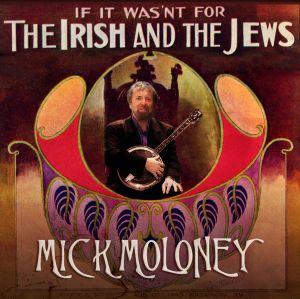
If It Wasn't For The Irish And The Jews
The Origins of Tin Pan Alley
 |
IF IT WASN'T FOR THE IRISH AND THE JEWS is a nostalgic look at the early days of Tin Pan Alley, when Irish and Jewish immigrants worked together to produce the songs that became the foundation of Broadway musical theater. Led by MICK MOLONEY, the National Heritage Award-winning musician/historian/narrator, with an all-star Irish band and the brass band of VINCE GIORDANO AND THE NIGHTHAWKS, it is an evening of rollicking songs, and tales of camaraderie and competition among the aspiring songwriters of old New York.
Mick Moloney sets the scene:
In 1912 William Jerome and Jean Schwartz, one of the most famous songwriting duos of early Tin Pan Alley, composed "If It Wasn't for the Irish and the Jews." This was a finely crafted song that had a catchy melody and clever and topical lyrics that celebrated Irish/Jewish collaborations in just about every aspect of American social and political and cultural life. Quickly recorded by the legendary Billy Murray it became an instant commercial hit.
What was not known at the time, however, was that the creation of the song itself involved an Irish/Jewish collaboration. William Jerome was actually the son of Patrick Flannery, a famine immigrant from County Mayo, but he changed his name when he saw the songwriting business switching from Irish to Jewish. Better perhaps not to be typecast in a rapidly changing entertainment scene!
In vaudeville and Tin Pan Alley's heyday between 1880 and 1920, Irish/Jewish collaborations on stage were commonplace. The term "Tin Pan Alley" was actually invented by a Jewish songwriter and journalist named Monroe Rosenfeld who wrote several Irish songs including "I'll Paralyze the Man Who Says McGinty" - a parody of the 1890's comic hit song "Down Went McGinty" written by Irish-American songwriter Joseph Flynn.
Tin Pan Alley was the name Rosenfeld gave in his 1892 newspaper columns to the area around 28th and Broadway where scores of music publishing houses were located as New York City became the center of the national song publishing industry. At any hour of the day one could hear the incessant tinkling of pianos as publishing houses plugged their wares to recording artists, vaudevillians and their agents. Rosenfeld likened the din to the banging of tin pans and the name stuck. Even though the music business was to move uptown northwards over time to mid-town Manhattan, the very name Tin Pan Alley was forever to be associated with the halcyon days of the music publishing industry on Lower Broadway.
The Irish/Jewish collaborations of Tin Pan Alley were attended by all sorts of interesting identity ambiguities. There was the famous Norah Bayes who had a huge hit with the Ziegfeld Follies with the song "Has Anybody Here Seen Kelly?". Bayes was actually born Norah Goldberg but changed her name, one assumes, partly to appeal to the huge Irish-American urban audience of the day in variety theater and vaudeville. One of her five husbands was Jack Norworth who wrote "Shine on Harvest Moon" with Norah and also the huge hit "Take Me Out to the Ball Game." Norworth himself also wrote and sang scores of Irish songs. The noted "Jewish" star of the New York stage, Eddie Foy, was actually Edwin Fitzgerald!
Though there were doubtless tensions and competitiveness and the usual business break ups and make ups, the Irish/Jewish Tin Pan Alley collaborations represent essentially a charming story of decades of good natured ethnic flux, competition and cooperation which left a lasting imprint on the history of American popular music.
Press Photos
 |
Tour Schedule
"If It Wasn't For The Irish And The Jews" has open availability for
2014-2015.
Back to Artist Menu
